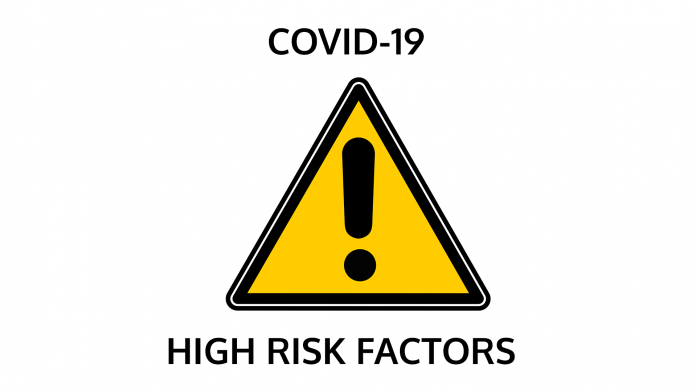Introduction / overview
This is a list of risk factors that make people more likely to be in a high risk group and develop severe illness or die from COVID-19 virus. (Last updated July 1 2020)
The list of underlying conditions is meant to inform clinicians to help them provide the best care possible for patients, and to inform individuals as to what their level of risk may be so they can make individual decisions about illness prevention. We are learning more about COVID-19 every day. This list may be updated at any time as the science evolves.
Age
The chance of severe illness from COVID-19 increases with age, with older adults at highest risk.
Note that the risk doesn’t begin suddenly at age 65. Instead, “people in their 50s are at higher risk for severe illness than people in their 40s. Similarly, people in their 60s or 70s are, in general, at higher risk for severe illness than people in their 50s. The greatest risk for severe illness from COVID-19 is among those aged 85 or older.”
People of any age with the following conditions are at increased risk:
- Chronic kidney disease
- COPD (chronic obstructive pulmonary disease)
- Immunocompromised state (weakened immune system) from solid organ transplant
- Obesity (body mass index [BMI] of 30 or higher)
- Serious heart conditions, such as heart failure, coronary artery disease, or cardiomyopathies
- Sickle cell disease
- Type 2 diabetes mellitus
People with the following conditions might be at an increased risk:
- Asthma (moderate-to-severe)
- Cerebrovascular disease (affects blood vessels and blood supply to the brain)
- Cystic fibrosis
- Hypertension or high blood pressure
- Immunocompromised state (weakened immune system) from blood or bone marrow transplant, immune deficiencies, HIV, use of corticosteroids, or use of other immune weakening medicines
- Neurologic conditions, such as dementia
- Liver disease
- Pregnancy
- Pulmonary fibrosis (having damaged or scarred lung tissues)
- Smoking
- Thalassaemia (a type of blood disorder)
- Type 1 diabetes mellitus
Sources & links
- CDC | People who are at higher risk for severe illness | CDC
- NHS | People at higher risk | https://www.nhs.uk/conditions/coronavirus-covid-19/people-at-higher-risk/

